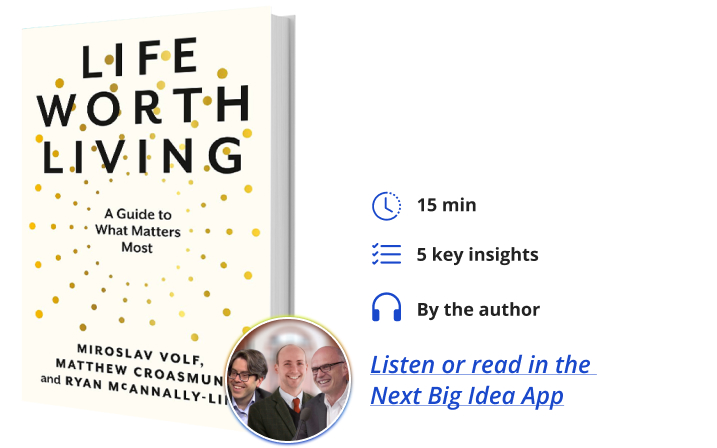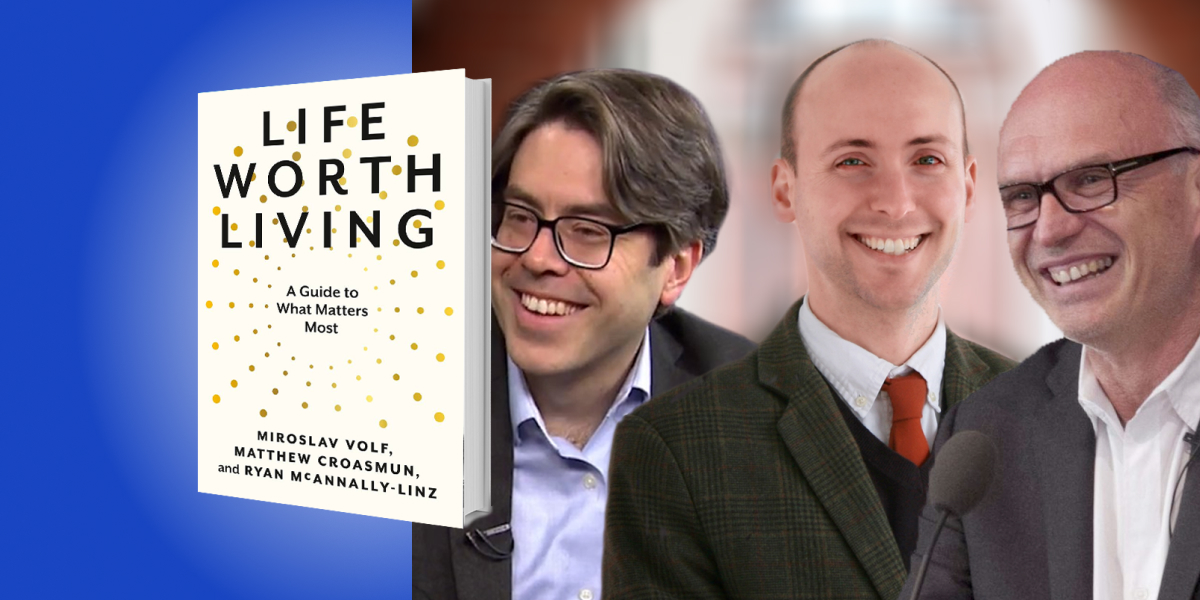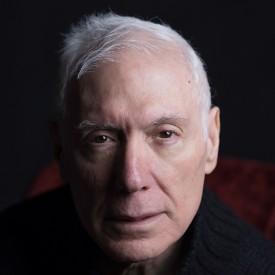Miroslav Volf, Matt Croasmun, and Ryan McAnnally-Linz work together at the Yale Center for Faith & Culture.
Below, they share 5 key insights from their new book, Life Worth Living: A Guide to What Matters Most. Listen to the audio version—read by Miroslav, Matt, and Ryan—in the Next Big Idea App.

1. Not everything you want is worth wanting.
All of us spend a bunch of time just doing what we do without thinking much about it. And that’s fine. Habits and routines and flow can be great. But sometimes it’s important to stop and ask questions.
When we do, our first question often has to do with effectiveness: how can we get better at getting what we’re after? There’s nothing wrong with efficiency per se, but efficiency is what we call “ends agnostic.” A super-efficient way of getting something you hate is different from a super-efficient way of getting what you want. But they’re both super-efficient. The difference isn’t one of efficiency but of outcome. It doesn’t do much good to get more of what we’re after if what we’re after isn’t what we really want.
And that points to a question that goes deeper than strategy and takes us to the level of self-reflection: what do we really want? Does professional success really matter to you as much as you think, or might your deeper desire be for something else—more and better time with family and friends, space for artistic creativity, and so on? Do you want to be well-known, or might you really desire to be known well?
Getting to the heart of these things can take serious work, and so this might seem like bedrock—as deep as it gets. What’s deeper than our deepest desires? It might seem like we simply can’t ask a more fundamental question. But we can. And we should.
2. Lean into disagreement.
The deeper question that can truly change our lives, ground us, and give us direction, is not “what do I really want?” It’s “what is really worth wanting?” This is one way of putting the most important question of our lives—the Question.
We can formulate the Question in a ton of different ways: What is a good life? What makes life worth living? What does it mean to flourish? And so on. They all involve the issue of worth. And they all point to the uncomfortable possibility that the desires we have could be profoundly misaligned, leading us astray into lives that are less significant—less good—than they could be.
“The great religious thinkers and philosophers have not, in fact, agreed about what it means to flourish as a human being.”
That can be a scary thought, especially when we see that people—sensible, well-meaning, incredibly smart people—seem to answer the Question differently. We need to lean into that disagreement. It can be tempting to convince ourselves that deep down everyone agrees about what matters most. That would be convenient. It would help us feel confident that we’ve gotten the answer right.
But the great religious thinkers and philosophers have not, in fact, agreed about what it means to flourish as a human being. The Buddha saw many things differently than Plato. James Baldwin has a profoundly different vision of life from John Locke. Try as we might, we can’t peel away the husk of their thought to find some common core.
The same is true of us ordinary folks. Some of us passionately believe that it’s almost always OK to put family first. Others suspect that putting family first leads to unfair societal outcomes and that families should sacrifice for the greater good. These aren’t two ways of saying the same thing. There’s a real disagreement here. We need to resist the temptation to brush aside these deep disagreements. We need to resist the temptation to look for a common core.
This is important for two reasons. First, pretending there’s agreement where there’s not is simply dishonest. Second, hiding our heads in the sand doesn’t do us any good. It shuts us off from the possibility of really learning from others. Sometimes facing disagreement will help us see that we haven’t thought things through well or that we missed an important value. Other times, opposing views will sharpen our own views and leave us with a better appreciation for our ideals and a stronger commitment to them.
As hard as it can be, it’s incredibly valuable to face up to our real, serious disagreements about what matters most and why. Don’t try to address the most important question of your life with your eyes closed.
3. You can’t tackle the big Question all at once.
I have two kids. When the older of the two was six years old, she was starting to get the hang of reading. She was cruising through the little beginner books that she had started with, your Very Hungry Caterpillars and Goodnight Moons. One day, she decided that she was going to read B. J. Novak’s amazing The Book with No Pictures to her three-year-old little brother. She was going to be the one who said all the silly things and made him laugh. It was going to be awesome.
“In this way, it’s still a big task, but at least there’s a path through the forest.”
Everything went great almost all the way through. She handled the phrase robot monkey with confidence. She belted out the silly sounds with gusto. But then, right toward the end, she got to the word preposterous and came up short. To her eyes, it was just an impossibly long string of meaningless letters. So, we broke it down into manageable pieces. PRE-POS-TER-OUS. That she could handle.
When you’re trying to figure out what matters most in life, a similar strategy is called for. Instead of taking it all at once, break it down into manageable chunks, smaller questions that are still pretty big, but that at least give some handholds. In this way, it’s still a big task, but at least there’s a path through the forest.
4. The good life is not a buffet.
Our answers to all the smaller sub-questions need to fit together, something like the ingredients in a good recipe complement each other. Whoever you answer to—if you really believe you’re responsible to them for how you shape your life—they will need to have a say about how you think a good life feels, what you ought to do about suffering you can’t avoid, and other questions like these. That’s part of what it means to understand ourselves as responsible to someone in that way.
Similarly, if you’re convinced that suffering has a productive role in even the best of lives, that will have to shape what you must say about how the good life feels. The answers to each question mold and influence each other. Otherwise, our vision of a good life winds up at war with itself, pulling us in different directions all the time.
Consequently, we can’t “shop” independently for answers to different sub-questions and then throw them together into a vision of life. Two ingredients—peanut butter and pickle relish, for example—can each be wonderful on its own but be nearly impossible to fit together in a good recipe. Similarly, if we love what medieval Christian theologian Julian of Norwich has to say about one thing and what modern Buddhist teacher Thich Nhat Han has to say about another, we can’t just assume those two pieces will fit together. Each of these thinkers has a rich, coherent vision of the good life. They offer answers to all the different questions we need to answer for ourselves, and their answers fit together. We can’t borrow pieces of what they have to say without making sure that the pieces will work together.
5. You. Will. Botch It.
You will fail to live up to your own standards. No matter how well you’ve thought out what it means to live well, your actual living will fall short of your ideals. Your failures might not be catastrophic. Little lies here. Tiny broken promises there. A string of small compromises that pull you slowly away from your purpose. Your failures might be totally unspectacular. But they will be real, and they will matter.
“The fact that we will fail to live up to our own standards hurts.”
I think of a time years ago when I botched it—bad. Money was tight and I was about to get married. Weddings aren’t cheap. In the middle of these money worries, my paycheck one week was double what it should have been. I convinced myself not to make any noise about it—you know, “bank error in my favor” or whatnot. It all came to a head when my boss asked me: “Hey, did you notice anything abnormal in your paycheck?” I stammered and shook my head. My boss tried again: “Are you sure? It looked like maybe you got paid double last week.” I squirmed a bit more but held my ground. You could see his face drop the moment he gave up on me coming clean. “Well,” he sighed, “congratulations on your wedding. I wanted to give you a gift.”
I had tried to steal my wedding present.
The fact that we will fail to live up to our own standards hurts. But it’s a fact. We need to face it, which means we need to think well about how to respond when we do fail. First, we need to be willing to recognize our failures. Denial might be a good strategy for politicians looking to hang onto their jobs. It’s not a good one for those seeking to live our lives well. Second, we need an approach that goes deeper than just trying to do better. We need to identify the resources that will help us do better. When it comes to seeking lives that are truly worthy of our shared humanity, we need all the help we can get.
To listen to the audio version read by co-authors Miroslav Volf, Matthew Croasmun, and Ryan McAnnally-Linz, download the Next Big Idea App today:
































